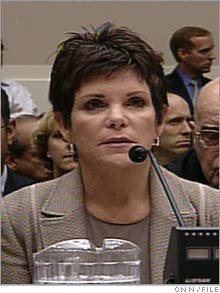Charges against HP's Dunn droppedDunn avoids jail time as judge throws out charges against ex-HP chair, citing her battle with cancer.NEW YORK (CNNMoney.com) -- A state judge in California Wednesday dropped the charges against ex-Hewlett-Packard Chair Patricia Dunn, who was accused of wire fraud in the company's boardroom spying scandal. Dunn originally faced four felony charges and jail time in the case.
Three other defendants - Kevin Hunsaker, Ronald DeLia and Matthew Depante - pleaded "no contest" to the wire fraud charge, a misdemeanor in California. Earlier today the California attorney general's office issued an incorrect e-mail press release stating that defendants would enter guilty pleas to the wire fraud charges. A representative in the attorney general's press office said the morning's release was a mistake. "It was just a mistake by me," said Nathan Barankin. "Our lawyers told me that the defendants were going to court and mak[ing] a plea. I mistakenly assumed that they'd be making a plea of guilty." Dunn's lawyer, Jim Brosnahan, said that the agreement to dismiss her case came Tuesday afternoon at a 45-minute meeting between defense lawyers, a representative from the attorney general's office, and Judge Ray Cunningham. Brosnahan said Judge Cunningham's role was to facilitate an agreement between the defense and prosecution and ultimately to approve it. "It was all ironed out yesterday," he told CNNMoney.com. "What happened this morning is the Attorney General's office presented the case against Pattie Dunn knowing that the judge was going to dismiss it. And it was dismissed." "Since she was charged on October 4th, it's been very clear that we weren't going to plead anything," he said, adding that the defense had been negotiating with the AG's office for a number of weeks. Other defendants Hunsaker is HP's former senior lawyer. DeLia is a private detective and owner of Outsourcing Solutions. Depante is a co-owner of Action Research Group, which is alleged to have surreptitiously obtained and sold confidential phone records. DeLia and Depante were hired by HP in the boardroom probe. The court did not accept the pleas of the other three defendants and offered to dismiss the charges against them if they met two conditions. By Sept. 12 they must serve 96 hours of community service and complete any court-filed restitution requests made by victims. Dunn is currently dealing with advanced ovarian cancer, which her lawyer described as "very serious." The court dismissed Dunn's charge Wednesday because of her cancer battle, according to the attorney general's office. The dismissal came "not because she's innocent but because she is sick," attorney general's spokesman Barankin told CNN. Dunn had breast cancer in 2000 and melanoma in 2002 and was diagnosed with ovarian cancer in 2004 and is still battling it. She also underwent extensive surgery last year after doctors discovered a malignant tumor in her liver. "I have always had faith that the truth would win out and justice would be served - and it has been," Dunn said in a written statement. The dismissal of charges in this manner "does not happen terribly often but this is something that the court came up with on its own," Barankin said. However, the California attorney general's office "strongly suggested we do this," he added. Dunn's arrest will remain on her record, according to Barankin. The dismissal came as a surprise to those watching the case because Dunn's health wasn't a central consideration in the plea negotiations between the defense and prosecution. Asked whether it was common for a medical concern to influence a judge's decision, attorney Jacob Frenkel of Shulman Rogers said, "It's a rare instance when it does occur, but it does happen. Judges have wide discretion in these matters." As HP chairwoman, Dunn initiated two separate investigations - one in 2005 and one in 2006 - into which member of the board of directors had leaked private HP information to the media. It was later alleged that the probe involved questionable practices, including pretexting - obtaining personal confidential information through false pretenses - to spy on HP directors, journalists and employees. The allegations sparked state and federal investigations. Dunn resigned from her role as chair and from the board itself after the scandal became public last September. Mark Hurd, HP's current CEO, replaced her as chairman of the board. Dunn was originally charged with four felony counts: conspiracy, wire fraud, stealing computer data and using personal ID information without permission. In December, the five defendants were offered a plea deal reducing the state felony charges to misdemeanors, in exchange for guilty pleas. HP shareholders vote In other Hewlett-Packard related news Wednesday, company shareholders rejected a proposal that would have given investors the right to nominate directors to the computer maker's board. About 39 percent of HP shares entitled to vote at the company's annual shareholder meeting favored the measure, which was supported by funds including Calpers, the largest U.S. pension fund, and the California State Teachers' Retirement System, the No. 3 fund. The vote at HP's annual shareholder meeting in Santa Clara, California, was short of the 66.7 percent required for ratification. Although September was a rocky month for HP, its stock actually rose a bit that month, ending at $36.69. It has since climbed to nearly $40 as HP continues to perform strongly in the PC and printer markets. HP (up $0.24 to $39.79, Charts) shares rose 0.6 percent in midafternoon trading Wednesday. --Additional reporting by CNN's Katy Byron, Reuters contributed to this report. |
Sponsors
|

